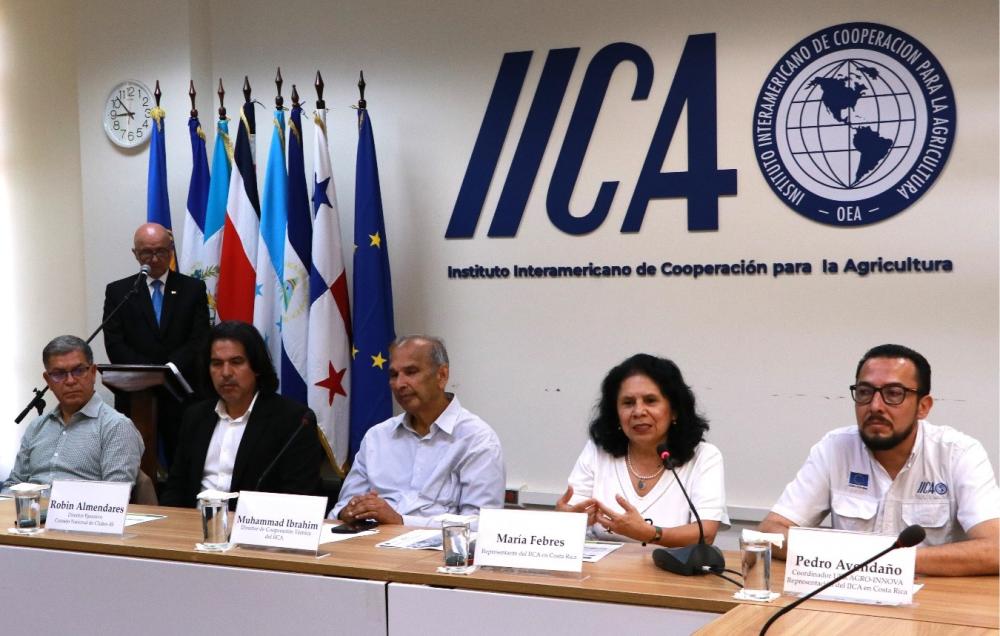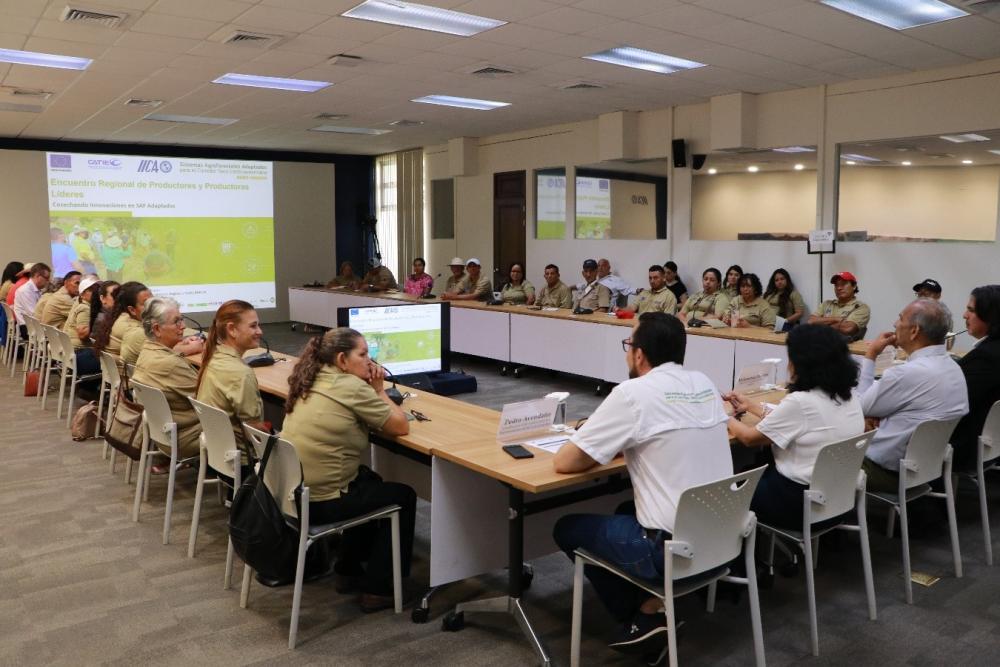More than four thousand Central American producers have benefited from AGRO-INNOVA, a project financed by the EU and implemented by IICA

San José, 2 October 2024 (IICA). More than 30 producers from Costa Rica, Guatemala, Honduras, El Salvador and Panama, representing the more than four thousand beneficiaries of the AGRO-INNOVA Project, met at the Headquarters of the Inter-American Institute for Cooperation on Agriculture (IICA) in Costa Rica to share their experiences with technological innovations that are allowing them to improve crop and animal management and soil protection.
The three-day meeting, which included a field trip to the Tropical Agriculture Research and Higher Education Center (CATIE), was organized by the Agroforestry Systems Adapted to the Central American Dry Corridor Project, implemented by IICA with support from CATIE and financing from the European Union.
“The project has generated knowledge and we must continue to scale up and share that knowledge with more producers, and stand ready to provide further support so you farmers have the tools you need,” said IICA’s Director of Technical Cooperation, Muhammad Ibrahim.
Miguel Barquero, Technical Assistant Manager of the Coffee Institute of Costa Rica (ICAFE) mentioned that: “For a long time, we’ve been working with the support of IICA and CATIE on initiatives that help us resolve the difficulties we encounter every day. The creation of networks like this one gives us the means to tackle future challenges. We definitely have to try to keep making progress with an amalgam of information and knowledge.”
During the meeting, it was emphasized that the work of the AGRO-INNOVA Project has been specific to each country, taking into account the particular conditions and needs of each one: “Accessing some of the areas where we’ve worked is very difficult. Given the conditions, the entire team that has worked in the countries for five years must be commended for the results now being achieved. I’ve seen a series of impacts and effects that this project has generated, such as the improvement in the quality of life,” said María Febres, IICA Representative in Costa Rica.
Robin Almendares, Executive Director of the National Council of 4S Clubs, remarked that: “in the case of women and young people, the biggest challenge is finding effective ways of attracting them to agriculture, having them fall in love with farming, and different programs were developed through AGRO-INNOVA to achieve this, identifying their potential, working on empowerment, bringing them closer to technologies and how they can apply them in their productive projects. Field schools have also been implemented. It’s made an important contribution to Costa Rican society and to the agriculture sector.”
Finally, Pedro Avendaño, Coordinator of the AGRO-INNOVA Project, emphasized that: “We’re working in 33 territories, in 109 communities. The lead farmers present here today are some of the 93 who worked with us to provide assistance to 4002 producers. And this is the leadership profile we want from AGRO-INNOVA, this is how we have to work in agriculture.”

Success Stories from the AGRO-INNOVA Project
In sharing their experiences, the Costa Rican producers mentioned the training they received from AGRO-INNOVA on infrastructure issues. The approach adopted is one that is manageable for smallholders, focused on organic fertilizers, nutrition, and animal management.
“With IICA’s help, I’ve been able to make changes in my coffee seedbeds and in the renewal of plants. Before, I had to buy them, but now I produce and plant them myself. I’ve also learned about soil conservation and appropriate forest management,” commented Rodrigo Chinchilla, a Costa Rican producer.
In the case of Guatemala, farmers highlighted IICA’s technical cooperation in areas such as organic production, the implementation of adapted agroforestry systems, and the prevention of soil erosion. “I think the project has taught us many things, but the incorporation of multi-strata systems has enhanced the quality of the soil and nutrients, which has improved nutrition in my community, increasing food security and making life better for people,” remarked Rafael Mejía, a producer from that country.
Panama’s farmers mentioned IICA’s support for the planting of fortified rice and the thinning of trees, which involves removing sick trees to encourage the growth of better-quality ones. “Many things have really had an impact, but one that I’d like to highlight is water harvesting, because we lacked a reservoir for the irrigation system,” explained Orlando Jiménez.
Wilbar Reyes, a producer from El Salvador, emphasized IICA’s support for the diversification of crops and soil conservation techniques. “What has impacted me most is the permanent plant cover on our plots, which has allowed us to lower costs and use less chemicals.”
Finally, the farmers from Honduras stressed the importance of IICA’s support with the diversification of production. Any given producer may now have bees and fish, and grow coffee, plantains, cassava, and other crops. “I think what has left the biggest mark on me is tissue management. We had old plants and we’ve managed to rejuvenate them, and I think that is what’s helped us the most,” concluded Honduran producer Héctor Figueroa.
More information:
Institutional Communication Division.
comunicacion.institucional@iica.int